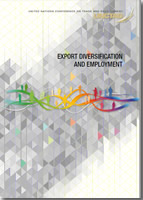
There is a general consensus that trade has high potential to foster inclusive growth and create employment. Thus, classical trade theorists recommended active trade participation for both developed and developing countries based on comparative advantage.
They also recommended that countries should specialize in producing and exporting commodities for which they have comparative advantage, while importing those for which they lack comparative advantage. Hence, exports specialization was touted as being economically preferable to diversification. However, more recent theoretical and empirical studies have emphasized the importance of export diversification, rather than export specialization or concentration.
Key reasons for this paradigm shift include the likelihood that export diversification favorably influences the pattern of growth and structural transformation that countries and regions experience, coupled with the fact that diversification increases a country’s ability to meet objectives such as job creation and improvements in income distribution.
A strong link is deemed to exist between the poor state of export diversification and the dismal nature of employment creation in developing countries, especially in Africa. Indeed, there is a major concern that the pattern of African exports manifests instability that has been found to be independently growth-inhibiting.
Sub-Saharan Africa currently has one of the highest levels of unemployment in the world -- with its 2010-2014 average official unemployment rate of 8%, in contrast with 3.9% in South Asia and 4.4% East Asia and Pacific (ILO, 2017).
The present paper seeks to answer several questions:
-
Is there a relationship between export diversification and employment generally and particularly in Africa and least developed countries (LDCs)?
-
What does the theoretical and empirical literature reveal about the relationship?
-
Assuming that export diversification is potentially an important positive determinant of employment creation in Africa and least developed countries, then what are the appropriate policies for increasing it?
To answer the above questions, the present paper, first, takes stock of the theoretical literature on the relationship between exports diversification and employment in developing countries, with a focus on Africa and the LDCs. Second, it provides evidence on employment effects of exports diversification based on existing pertinent empirical studies. Third, it empirically estimates the effects of export diversification on various employment measures. Fourth, it provides a brief review of the factors affecting export diversification. Fifth, it lists a number of both opportunities and challenges associated with attaining export diversification. Lastly, the paper makes recommendations toward export diversification policies that could lead to employment expansion in Africa and the LDCs.



